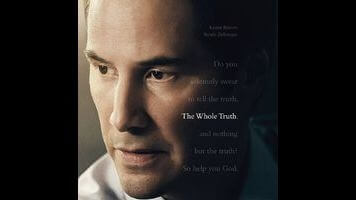An A-list cast and crew make a C+ courtroom drama with The Whole Truth

The Whole Truth is a moderately clever, reasonably entertaining courtroom drama, which is only a problem given the talent involved with bringing something this middle-of-the-road to the screen. This is director Courtney Hunt’s first film since 2008’s Oscar-nominated Frozen River, a Sundance sensation that showed she had a strong feel for nuanced characters and unconventional locations, as well as an understanding of law-and-order stories born partly of her own past as a law student. Stars Keanu Reeves and Renée Zellweger have bounced between A-list and journeyman status throughout their careers, but supporting players Gugu Mbatha-Raw and Sean Bridgers are brilliant actors who deserve to build on their recent triumphs in Beyond The Lights and Rectify with something better than their seat-filler roles here. Usually, with a movie as mundane as The Whole Truth, it’s tempting to say that a better cast and crew would’ve made something more special. But on paper, this film had the goods.
Reeves plays Richard Ramsey, a cynical attorney who signs on to a case involving an old colleague, Boone Lassiter, a piggish high-powered lawyer played by Jim Belushi. Boone’s been fatally stabbed through the heart, and his son Mike (Gabriel Basso) has been arrested for the murder, even though Boone had many enemies, including his abused wife Loretta (Zellweger). But Mike is reported to have confessed, and he refuses to talk to anyone, which leaves his counsel scrambling to come up with a defense. Ramsey chooses to let the trial commence with minimal preparation, so that he can pressure his client to speak and can get a better feel for who’s lying—with the help of an ambitious second-generation lawyer, Janelle (Mbatha-Raw), who has a sterling reputation as a “bullshit detector.”
Hunt and screenwriter Rafael Jackson seem to be aiming here for a surprising legal thriller with a hint of Rashomon. The film launches into the trial scenes in its opening minutes, letting the testimony serve as a segue to flashbacks and backstory. Each new witness changes the narrative—sometimes a little, sometimes a lot. What begins as a routine case of patricide, with a child admitting to killing his ogre of a parent, becomes more complicated as different friends, family members, and acquaintances paint very different pictures of Boone, Mike, and Loretta.
Those courtroom scenes are the best parts of The Whole Truth, as the movie keeps teasing out new information—often with the assistance of overqualified bit-players like Bridgers, who commands the screen during his character’s few minutes on the stand. For the most part, The Whole Truth functions similarly to the last half-hour of any given old Perry Mason episode, only stretched out to 90 minutes. There’s a lot here about trial strategy, from the finer points of picking apart a police statement to how an outwardly fumbling approach to putting on a case can win a jury’s sympathy. Meanwhile, Hunt’s visual style is effectively square and unfussy, looking more like Law & Order: Special Victims Unit (a show she’s actually directed) than the edgy indie that launched her career.
But by the time Hunt and Jackson get to the lurching twists in their third act, it’s pretty clear that this picture doesn’t have much to offer besides plot. None of the characters are especially well-defined beyond the broadest pulp archetypes, and while the cast is skilled enough to hold the audience’s attention even when not much is happening, in a way their very presence promises more than The Whole Truth can deliver. This is by no means a bad movie. But after a while, its biggest mystery isn’t, “Who killed Boone Lassiter?” but rather why these actors and filmmakers felt compelled to waste a few months of their lives—and an hour-and-a-half of ours—asking that question.